Live blog: Dutch election day as it happens
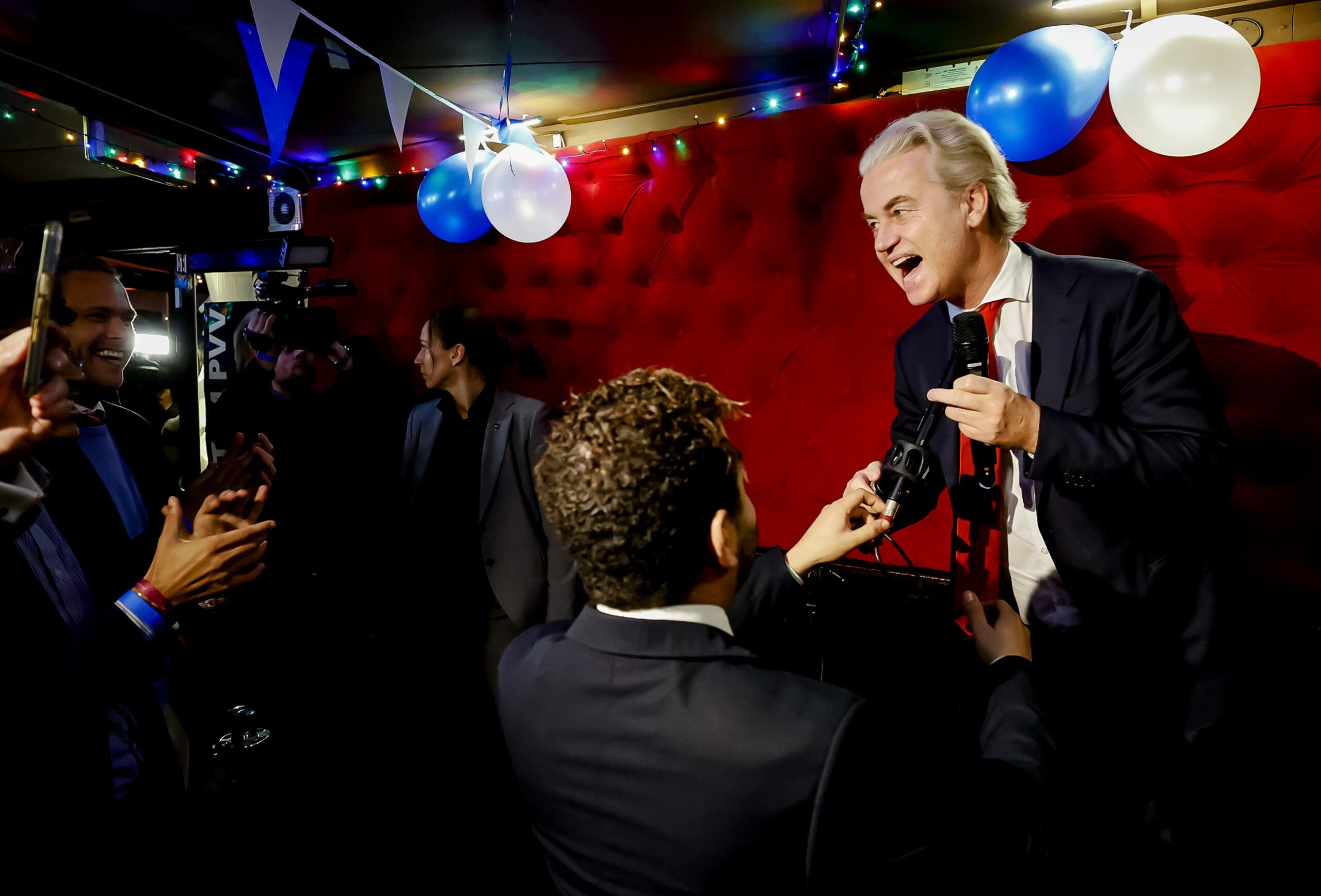
The Netherlands goes to the polls on Wednesday to elect a new lower house of parliament and, therefore, government. Dutch News is following the latest developments as they emerge.
Revised exit poll: PvdA-GL lose a seat, VVD gain
An updated version of the NOS exit poll released shortly before 10pm reduced the projected number of seats for the PvdA-GroenLinks joint list to 25, while the VVD rose from 23 to 24 to narrow the gap in second place.
It means the PVV has a 10-seat lead over its nearest rival, while a PVV-VVD combination would need to find 17 seats from other parties to form a government with a working majority.
Dassen: “Time to man the barricades”
Volt leader Laurens Dassen said he had congratulated Geert Wilders on his success “with a heavy heart”.
“The largest party in the Netherlands is pro-Nexit, excludes people, is against the rule of law and against solving the climate crisis. Everything the PVV stands for is diametrically opposed to what Volt stands for.
“We need to man the barricades to make sure the pro-European voice is heard in our parliament. The PVV wants to stop funding Ukraine. We need to solve these problems together in Europe.”
He accused the VVD and CDA of paving the way for Wilders by blaming Brussels for problems in the Netherlands. “There are more parties that have hardly mentioned Europe when we all know that there are problems that can only be solved in Europe.”
Bikker: Concerns about increasing polarisation
Mirjam Bikker, leader of the ChristenUnie, said her party viewed the projected outcome with “concern”.
She feared that the PVV’s win would polarise the country further. The CU, the smallest party in the outgoing coalition, slipped to three seats after winning five at each of the last four elections.
“Our country is built on minorities who hold each other together and know how to reach each other,” she told a party gathering in Amersfoort.
“These elections have left many things up in the air and that requires wisdom for the whole country from the winners of these elections instead of stoking polarisation.”
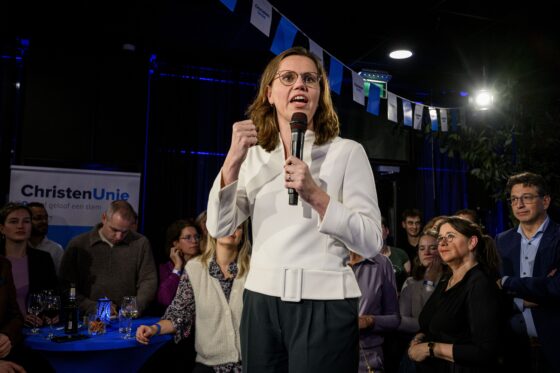
Van der Plas: “See if Wilders sticks to his promises”
Farmers’ party leader Caroline van der Plas said she expected to be part of the next government after the exit poll predicted seven seats for the BBB.
“Obviously we were on 30 [in early polls] and we’ve seen a downward trend, but seven seats is still brilliant.
“We will go into the coalition negotiations and I have 100% confidence that we will end up in the cabinet.
“Two and a half million people have voted for the PVV and you can’t ignore them. Wilders is the leader of that party, he has made promises to be milder on a number of points. We will see if he keeps those promises.”
Van Baarle: “Wilders is a threat for a million Dutch Muslims”
Stefan van Baarle, leader of the migrant rights’ party Denk, said he was “proud” that his young list of candidates was on course to retain their three seats.
Speaking at a meeting of party activists in Amsterdam-Osdorp against a background of Palestinian flags, he said: “We’ve come out of a difficult situation with early elections, the power of the big parties trying to lure people into voting tactically.
“We’ve been through a change in our party and I am hugely proud of the fact that we have remained stable and a new generation of Denkers has emerged.”
Van Baarle refused to observe the formality of congratulating Geert Wilders on the PVV’s election success. “The fact that the PVV is the biggest party is a threat for a million Dutch Muslims,” he said.
“Mr Wilders wants to take away their rights, it is a threat to our legal state and it absolutely does not deserve to be congratulated. It’s a reason to fight harder and harder against discrimination.”
Timmermans: “We will defend democracy”
Frans Timmermans, leader of the Labour (PvdA)-GroenLinks joint list, vowed to “defend democracy” in an emotionally charged speech, immediately after congratulating Geert Wilders on his expected victory.
Timmermans roared over the noise of a cheering crowd: “We will defend the rule of law. The rule of law is sacred to us.”
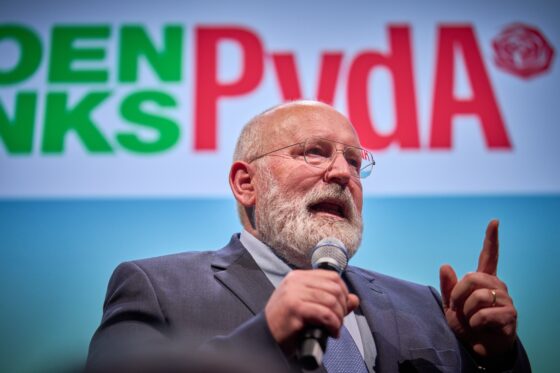
“We will never go into a coalition with a party that excludes people in the Netherlands.”
Timmermans said he was “disappointed” with the outcome, but added: “It is also true that two parties that only recently found each other have stood shoulder to shoulder. That’s what I observed in the last few months.”
He began his speech with a plea to his supporters to look out for each other. “Hold each other close. We don’t let anyone go in the Netherlands,” he said.
“If in the coming days, in your neighbourhood, at school, at work, you come across people who ask after tonight: ‘Do I still belong here?’ then tell them: ‘Yes’.
“And do me a favour and say immediately: GroenLinks-PvdA has formed this partnership so we can say to you: ‘We’ve got your back’.
“In the Netherlands everyone is equal. It doesn’t matter where your crib stood, your parents’ crib or your grandparents’ crib. You absolutely belong.”
Wilders still has his extreme ideas, says Rob Jetten
Rob Jetten, leader of D66, said that despite Wilders’s efforts to appear less extreme in his campaign, “his extreme ideas are still there in the background”.
However, he said, the VVD is also to blame. The party chose to allow the coalition to collapse in the summer “over the backs of refugees”. The VVD has “opened the door” to the PVV by normalizing the politics of intolerance”.
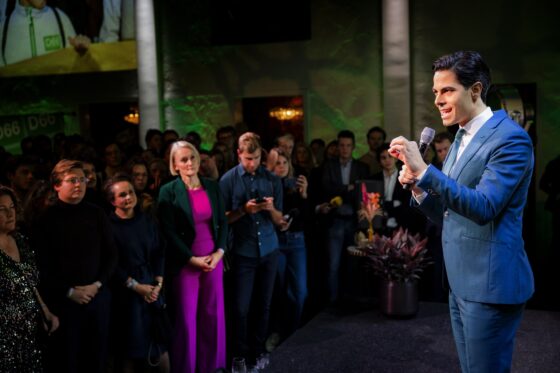
D66, he said, would always speak out, even when others remain silent.
Groningen University political scientist Leone de Jong told NOS that Jetten was right to partly blame the VVD. “The VVD let the cabinet fall over migration, but that theme has been claimed by the PVV and people prefer the original,” she said.
Yesilgöz: “Not a mistake” to open the door to Wilders
VVD leader Dilan Yesilgöz denied her party had made a “tactical error” by dropping Mark Rutte’s block on Geert Wilders’s party.
“I don’t think so. We’ve said the whole time that this is about the concerns of people who don’t feel listened to,” she told NOS.
“If you keep ignoring them, the cabinet didn’t fall for no reason, then this is what you get. That’s the issue here.”
“We are prepared to govern”
Pieter Omtzigt said voters had put their trust in his Nieuw Sociaal Contract party to bring about change after win 20 seats just three months after he launched it.
Omtzigt congratulated PVV leader Geert Wilders on a “historic” election result and said his party was “available” to play its role in forming the next government.
“Three months ago we were so small, but today a million people have put their trust in us. Trust in better governance for the Netherlands, a secure existence and control of migration.”
“We are prepared to turn that trust, which we take very seriously, into acts, starting tomorrow.
“We have the plans and we can carry them out, but it is not easy. This election result will ask a lot of politicians to go against their instincts. We will see how they do it, but the Netherlands must and will be governed and we are ready to play our part.
“The hope of a better future rests with us and we will work towards it in the coming years.”
Schiermonnikoog is first with its results
Schiermonnikoog won the traditional competition to present its results first, with the GroenLinks/PvdA alliance taking 26% of the vote, with the VVD in second place on 15%. Pieter Omtzigt’s NSC was in third place on the island, and the far-right PVV, which is the big winner according to the NOS exit poll, would take 11%.
The island has just 800 voters but always records a turnout of over 100% because of all the holidaymakers on the island.
“VVD will learn from the results”
VVD leader Dilan Yesilgöz told her disappointed audience that the party had not “listened well enough” to voters. “It is a disappointing result for us,” she said. “But we will build on this and learn the lessons from today. We will build towards a Netherlands that we believe in.”
Yesilgöz had been on the road to becoming the Netherlands first female prime minister, having taken over the leadership of the party from Mark Rutte, who was prime minister for 13 years.
“Tsunami of refugees and immigrants will be limited”, says Wilders
PVV leader Geert Wilders told a cheering crowd that the results show that the voters of the Netherlands have had enough. “The Dutchman will be back in first place,” he said. “The Netherlands has hope… the people of the Netherlands will get their country back and the tsunami of refugees and immigrants will be limited.”
At the same time, he said, the result is an enormous responsibility and the party had to do its best to make sure the hopes of the people of the Netherlands are realised. “We will have to work together with other parties,” he said. “We cannot be ignored.”
Every party will have to make sacrifices in order to work together, he said. “We want to be part of government.”
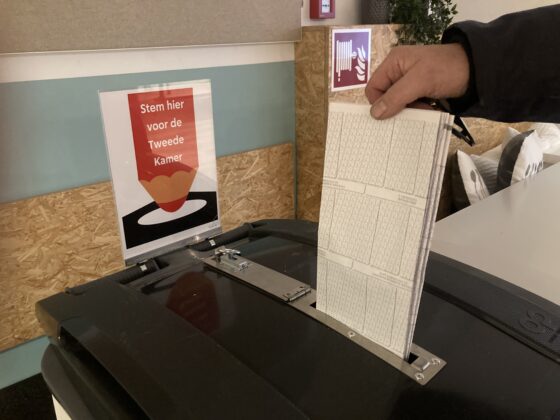
Shock surge in PVV is down to migration issue, expert says
Political scientist Tom van der Meer said on NOS that the shift in support towards the PVV is the biggest ever in Dutch parliamentary history.
The far right party’s support has doubled since the last election – and 80% of the party’s voters say his stand on immigration is the main reason for voting PVV.
Van der Meer said that 11 years of a centrist government, the fact that the NSC and VVD made migration an issue and the VVD’s decision to open the door to the PVV all helped the party to the big win.
Wilders has not yet arrived at the PVV party location in Scheveningen.
PVV big winner in the NOS poll
The far right PVV emerged as the biggest party in the Dutch general election according to an NOS exit poll with 35 seats in the 150 seat parliament. The support for Geert Wilders’s party – at 23% – is far higher than opinion polls had suggested.
The poll put the GroenLinks/PvdA alliance 26 seats in the 150-seat parliament, with the VVD on 23. All three parties had been neck and neck in the run up to Wednesday’s vote.
Pieter Omtzigt’s new party NSC was fourth in the NOS poll, on 20 seats. Omtzigt had been the most popular candidate for prime minister but support for the party has cooled in recent days.
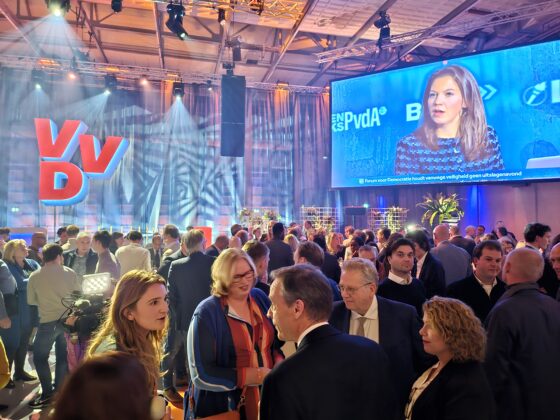
15 minutes to the NOS exit poll
There are just a few minutes to go before broadcaster NOS publishes its exit poll, which will give an indication of what the election results are likely to be. Meanwhile, the Wadden Islands of Schiermonnikoog and Vlieland are both competing to the first to declare their results. Schiermonnikoog has an electorate of just 800 but this is always boosted every year by tourists who head to the islands specifically to vote.

Dutch royals don’t vote
Princesses Amalia and Alexia are not voting in the general election despite reaching the age of 18, the state information service has told the Telegraaf. King Willem-Alexander and queen Máxima do not use their votes either, because of their wish to be politically neutral.
The king said in 2017 that if voting was compulsory in the Netherlands, he would leave the ballot paper blank.
His niece Eloise van Oranje, who has 428,000 followers on her Instagram account, did set out to vote but was turned away from the polling station because she had forgotten her ID.
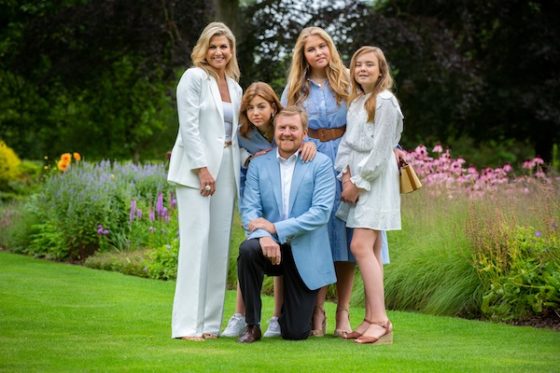
Over 60,000 Dutch expats abroad have voted
Nearly 63,000 Dutch nationals living abroad have taken part in the Dutch elections by sending their ballot to The Hague city council or voting via the Dutch diplomatic missions in the countries where they live.
In total, 100,000 Dutch expats are registered to vote. Postal votes had to be delivered by 3 pm today, but ballots sent via embassies can be collected until next Monday at 5 pm. The SNBN foundation, which represents Dutch nationals abroad, had recommended people vote by proxy to make sure that their votes counted.
In the Netherlands, turnout overall had reached 40% by 3.45 pm, down some three percentage points on the 2017 figure.
If you are feeling frustrated because you pay tax but have no say in the national elections, you can still take part in the Dutch News online election.
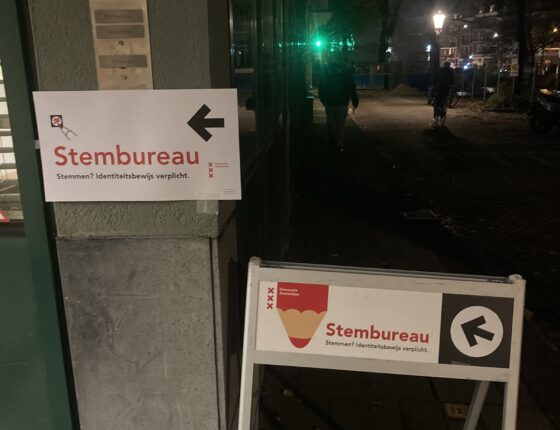
Turnout so far is down on 2017
Some 28% of the 13 million people eligible to vote in Wednesday’s general election had done so by 13.45, according to research bureau Ipsos. At the 2017 general election, turnout by this time was 33%.
The 2021 figures were distorted by coronavirus and voting took place over a three day period, producing a total turnout of nearly 79%. In 2017, turnout was 81.6%.
Polling takes place up to 9 pm.
If you are frustrated by not having a vote, why not take part in the Dutch News online election and have your say that way.
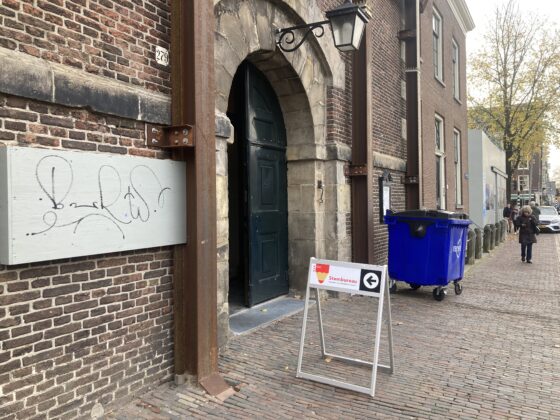
Slow voting at the end of the pier
From Gordon Darroch: Voting on Scheveningen pier, several hundred metres out beyond the shoreline, could best be described as sedate, despite the clear skies and fresh sea breeze.
By 1pm fewer than 90 people had made the trek up from the boulevard to cast their vote.
“I’ve been at polling stations where thousands of people pass through before, so this has been pretty quiet,” said chairman Bram Perenboom.
“It’s hard to know when the rush might come. Maybe in the middle of the day when people come out for a walk on the beach.”
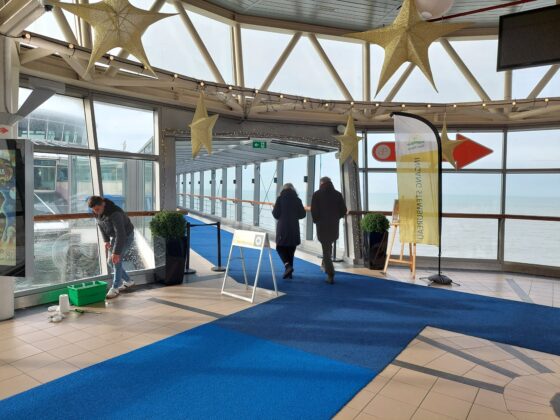
Erwin Seydel, 76, arrived to vote with his wife. “It was a quiet campaign compared to the last few, but the tone changed at the end,” he said. “A lot of promises were made, so there’s going to be some disappointment.”
Mr Seydel described himself as a “loyal” D66 voter, but decided to vote for Frans Timmermans’s PvdA-GroenLinks combination this time.
“It was a strategic choice,” he said. “I hope we get a government that is wise, that brings freedom and gives people space.”
Geert Wilders wants to be prime minister of “all the Dutch”
The complicated process of putting together a new coalition, likely to involve at least four parties, will start on Thursday, once the votes have been counted. No party, ahead of Wednesday’s vote, was polling at more than 20% support, highlighting the tightness of the race.
The PVV, the VVD and the GroenLinks/PvdA alliance were level pegging in the final poll of the campaign, with the NSC close behind, and that raises the spectre of a very difficult formation process, political pundits say.
The NRC said in its analysis that there is little chance of a stable government, given all the focus on the “winner” and the potential of Geert Wilders to be the biggest.
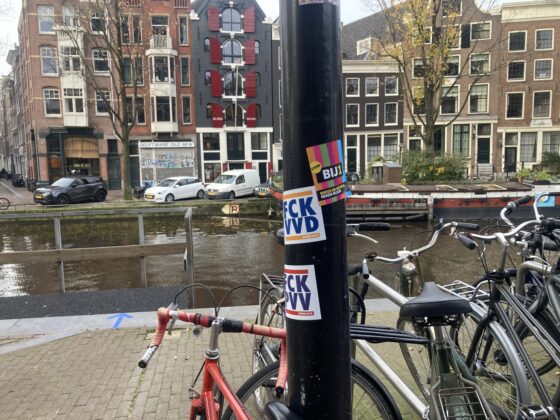
Wilders himself told Tuesday night’s final election debate that he planned to be the prime minister of “all the Dutch… whatever your background.”
The comment that was greeted sceptically by the VVD’s Dilan Yesilgöz. “I don’t think there is anyone who believes that,” she said. “His election manifesto shows the opposite. His wish is to eradicate Islam from the Netherlands. And I do not believe he will be prime minister. The Netherlands wants a leader who can bring people together, take a lead internationally and build majorities.”
Although Yesilgöz initially opened the door to the far right, she has now said the VVD will not work with Wilders as prime minister. But nor has she been keen to work with the GL/PvdA alliance.
- Gordon Darroch’s blog about the campaign: Chandlers Law and the Dutch election
Pieter Omtzigt, the maverick CDA politician who launched the NSC this summer, may well end up kingmaker in the coalition discussions. He has, after all, ruled out working with the PVV but not with the other two parties.
it is extremely unusual for four parties to have a serious chance at being the biggest. But the final debate, the NRC said, was “confirmation of what has been happening over the past few weeks: a lot of talk about political renewal, about voters concerns. But hardly anyone broke with the past, with 13 years of Mark Rutte.”
Fruit fight in Delft
From Molly Quell. Some of us have to work early on election day. (And late the night before. And late the night of. And early the next morning.) So I arrived as the church bells rang at 7:30 to cast my very first ballot as a newly minted Dutch citizen to participate in democracy before reporting on it.
At that time of the day, the city was mostly quiet, though plenty of people were spotted, stempas in hand, briskly heading in to vote everywhere from the Old Church to City Hall.
One very cute father was explaining to his young son why voting was important while strapping him into a bakfiets.
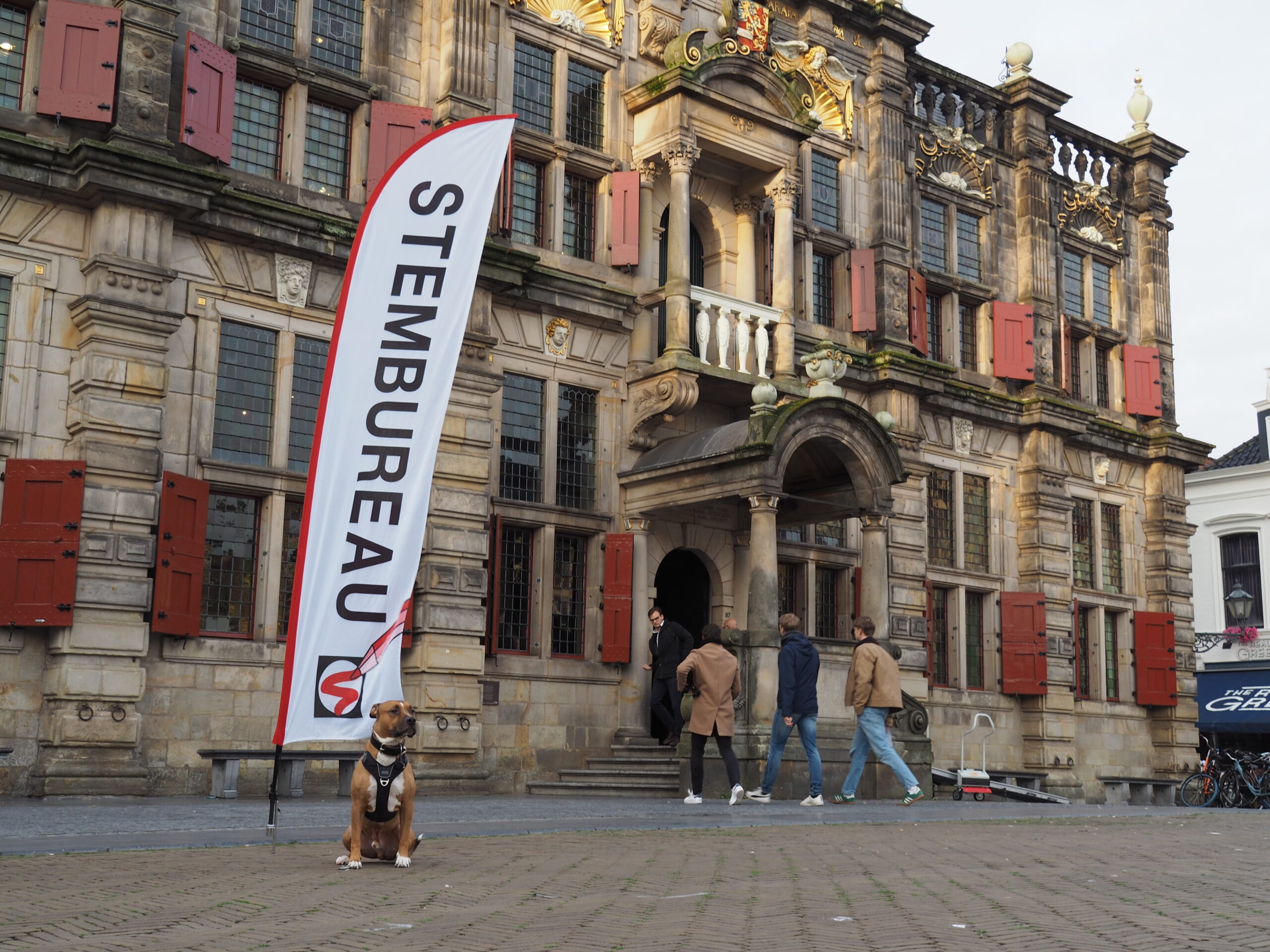
Trouby, the unofficially official Dutch News dog, even joined. He said he was still undecided but was leaning toward the Animal Party.
On the way home, I passed Delft’s mayor, Marja van Bijsterveldt, talking to some folks on their way to vote. The CDA politician offered an orange to the group, she had several, and one man accepted. When she explained that she had picked up the fruit at the D66 office on her way to the polling station, the man made a disgusted noise and lobbed the citrus into the nearby canal.
Anne Frank House opens its doors to defend democracy
From Robin Pascoe. There were no long queues of tourists outside Amsterdam’s Anne Frank house on Wednesday morning, just a few bemused visitors who could not understand why one of the capital’s most famous attractions was only open to voters.
It is the first time the building has been turned over to voting – although the actual ballot boxes were in the new exhibition centre.
“Why did they have to do it here?” said a Puerto Rican tourist. “At home we vote in schools.”
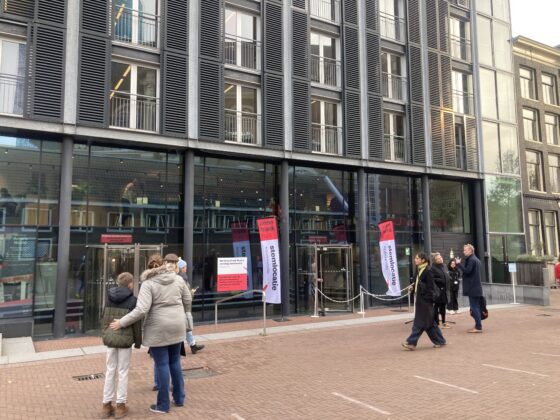
Voting had been brisk in the morning but slackened off around 11. “We expect it to get busy from around 3 pm,” said one of the helpers, standing outside in the chilly autumn sunshine.
A quote from Anne Frank herself was emblazoned across the posters alerting potential voters to the location. ‘How wonderful it is that no one has to wait, but we can start right now to gradually change the world!’
Everyone who visits the house to vote will get a red pencil with the text printed on it to take home as a reminder.
‘Anne Frank was born in a democratic country, but four years later her homeland had become a dictatorship,” said the foundation’s director Ron Leopold. “It’s important to realise that democracy is fragile and that we must cherish our democratic values. The right to vote is the foundation of our democratic rule of law.”
Temple of democracy in Leiden
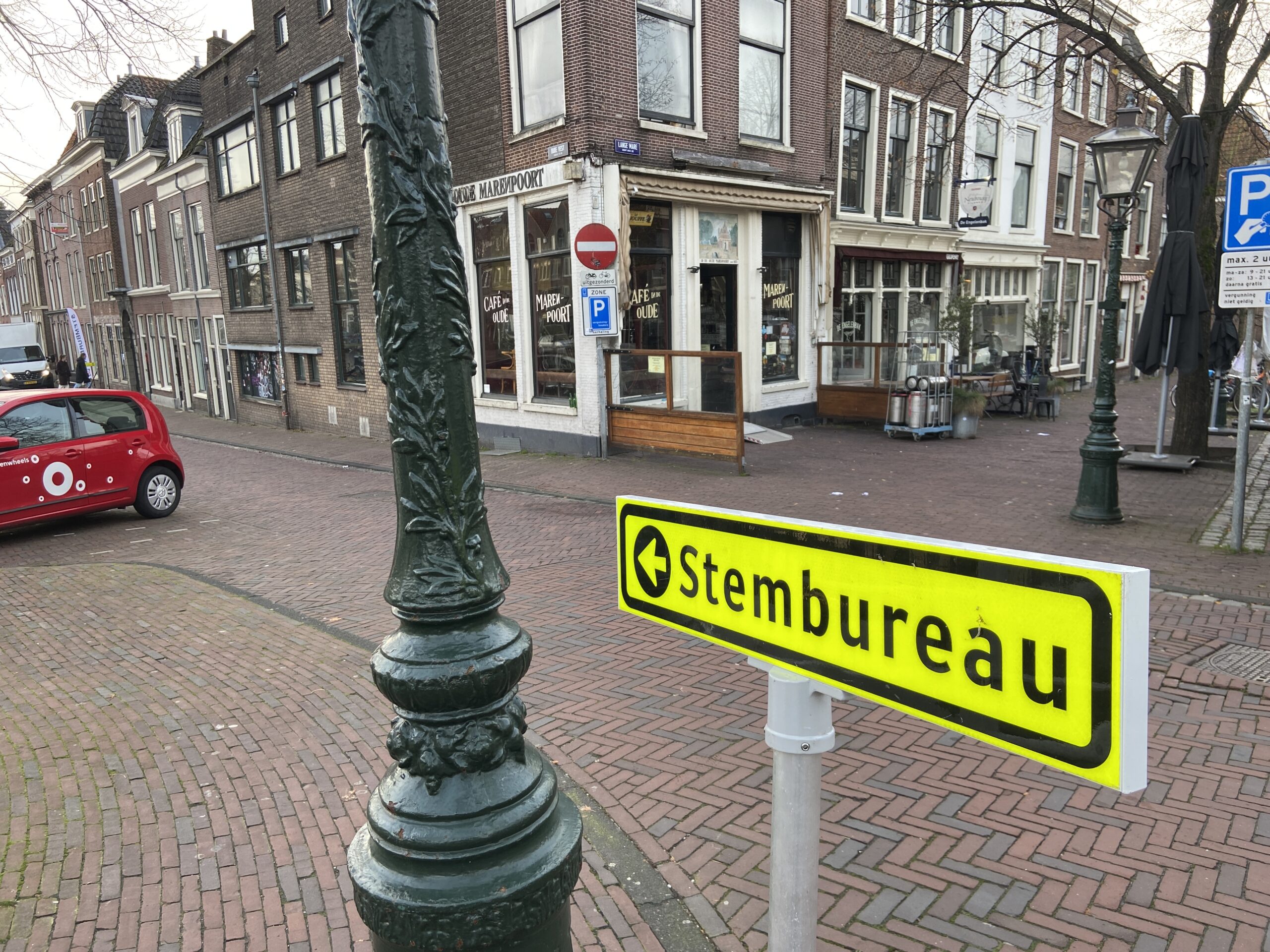
From Brandon Hartley: The mood was vibrant in Leiden this morning as polling station volunteers and voorzitters (election overseers) settled in for a very long day.
The voorzitter in the atrium at the Rijksmuseum van Oudheden told Dutch News his day began at 6.45am. He’s hoping to head home no later than 1am. He and his colleagues will be working in shifts until at least midnight.
The museum is one of the most distinctive places to vote in the Netherlands because the polling station is located beside the Temple of Taffeh, an Ancient Egyptian structure originally built in the first century BC.
“Once everything is over, we’ll have people come in and take everything down,” he said. “We have to get all the tables and booths out of here tonight.”
The first half of the morning was quieter than he had expected, but he expects things to pick up this evening as voters return from work. In previous years, the biggest rush was between 5pm and 8pm.
A steady trickle of voters, mostly retirees and stay-at-home moms with tykes in tow, were coming in during the 9am hour at the Rijksmuseum van Oudheden and Museum de Lakenhal.
“They’ve been coming and going in waves,” one polling clerk at the Lakenhal told Dutch News. “It will probably be crazy here tonight.”
Things were busier at a polling station set up on the second floor of Leiden Centraal railway station where a small group of commuters were waiting to vote. Out front, a cheerful group of campaigners for Partij voor de Dieren posed for a photo for Dutch News before they continued their journey into the city.
Early voting in Castricum
Most polling stations opened at 7.30am, but a handful of locations were open for a short time after midnight for voters who couldn’t wait to cast their ballots.
One of them was in Castricum, Noord-Holland, where second-ranked D66 candidate Jan Paternotte was among the early birds.
“I was the second person to vote, so the election’s going well for us so far,” he told RTL.
Vannacht gestemd! Op onze bevlogen en energieke lijsttrekker: Rob Jetten. Voor het onderwijs, het klimaat en een eerlijke economie. pic.twitter.com/ItFRTJrGVp
— Jan Paternotte (@jpaternotte) November 22, 2023
Party leaders are out in force, casting their votes
Party leaders have been out and about, casting their votes and posing for photographers as the polling stations open for the 2023 general election.
GroenLinks/PvdA leader Frans Timmermans voted at his home base of Maastricht, while D66 leader Rob Jetten voted in The Hague and Joost Eerdmans, leader of far right party JA21 cast his ballot in Rotterdam.
Geert Wilders, leader of the far right PVV, was surrounded by security officers and photographers as he voted in The Hague’s city hall. Mark Rutte, the Netherlands’ longest serving prime minister, also voted in The Hague.
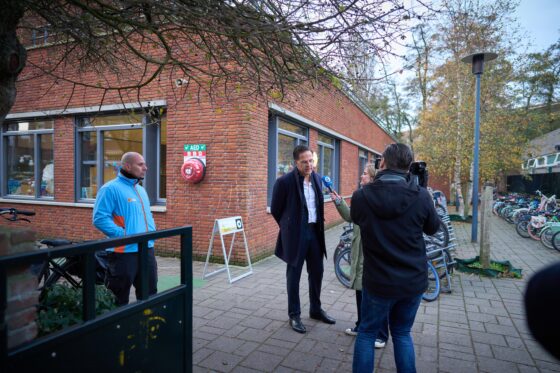
Unable to vote, but would you like to have a say? Join the DN election poll
Only Dutch nationals can vote in the 2023 general election. But if you’d like to have your say anyway, Dutch News is running a poll all day. Vote here.
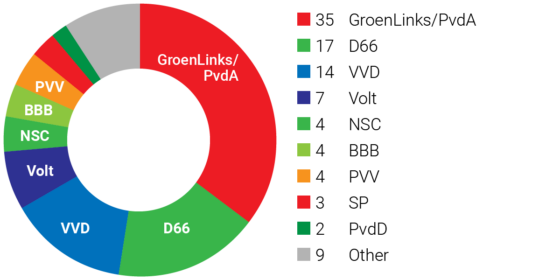
The 2023 general election: what you need to know
The Dutch News team as put together manifesto summaries for the 11 parties likely to win the most votes, as well as voting aids, interviews with leading candidates and some outspoken news and views. Read on
Nearly 10,000 locations are polling stations for the day
Dutch voters will be able to cast their ballot at 9,823 locations nationwide, according to the Open State Foundation. Most will open at 7.30 am and voting will end at 9 pm, when broadcaster NOS will publish its first exit poll.
- Inburgering with DN: How the Dutch political system works
- Inburgering with DN: the main political parties
However, 221 polling stations, many of which are at train stations, will open earlier, as will the handful of mobile polling stations which will travel around in rural areas.
Among the more unusual locations where voting is taking place are the Anne Frank House in Amsterdam and Madurodam in The Hague. Cinemas, museums, churches and even a private home will also become polling stations for the day.
The weather forecast for Wednesday is for a dry day with some sunshine in the morning, and frost in sheltered places at night. Experts suggest that good weather encourages more people to vote, with the lowest turnout ever recorded – just 73% – taking place on a chilly wet day in 1998. Turnout at the last general election was 78.7%, down three percentage points on 2017.
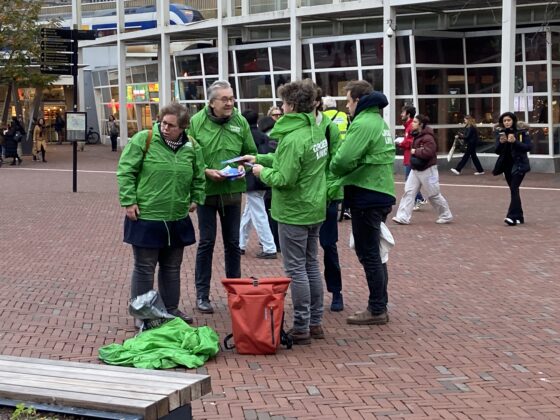
Demonstrator disrupts television debate
Tuesday night’s final televised election debate was disrupted at the end by a demonstrator from youth party Lef (which translates as daring).
Frans Timmermans from GroenLinks/PvdA, Dilan Yesilgöz who took over the VVD from Mark Rutte and Pieter Omtzigt, founder of new party NSC, were debating trust in the government, when the conversation was interrupted by shouting.
“You are part of old politics, you should never be in power again,” the demonstrator yelled, before he was removed by security guards.
The party earlier interrupted a broadcast of the Buitenhof current affairs show by climbing up a later and holding a Lef poster in front of the window.
Thank you for donating to DutchNews.nl.
We could not provide the Dutch News service, and keep it free of charge, without the generous support of our readers. Your donations allow us to report on issues you tell us matter, and provide you with a summary of the most important Dutch news each day.
Make a donation